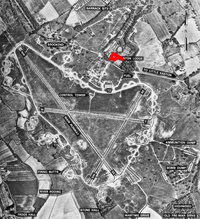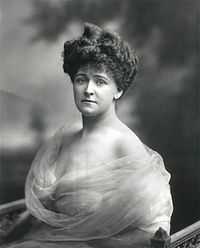Easton Lodge



Easton Lodge was a Victorian Gothic style stately home to the west of Great Dunmow, Essex in England. Once famous for its weekend society gatherings frequented by the Prince of Wales (later King Edward VII),[1][2] it was one of many country houses destroyed during the 20th century. Part of the west wing (rebuilt as a separate house after a fire in 1918 for use as servants' quarters) still stands; and the Grade II listed gardens designed by Harold Peto have been largely restored and opened to the public.[1][3]
History
Designed by Thomas Hopper, Easton Lodge replaced an earlier Elizabethan mansion destroyed by fire in 1847, which in turn replaced an earlier hunting lodge.[4] The hunting lodge and grounds were granted to Henry Maynard in 1590 by Queen Elizabeth.[1]
Most famous of those who lived at the house was Daisy Greville, Countess of Warwick, who was born Frances Evelyn Maynard at Easton Lodge in 1861 and inherited the estate when just four years old.[2] She become a socialite and mistress to King Edward VII, and continued to live at Easton Lodge with her husband, the 5th Earl of Warwick after her marriage.[5] As a result the Lodge became famous for its society gatherings.[1] The family of H. G. Wells also lived in one of the properties on the Easton Lodge estate.[6]
During World War II the estate was requisitioned by the War Office, leading to the destruction of some 10,000 trees to enable the construction of RAF Great Dunmow (also known as RAF Little Easton) in the former park.[3][7] The house was largely demolished following its return by the military in 1950.[7]
After 30 years of abandonment the west wing was purchased in 1971 and is now used as a private house. The late 19th century stable cottages and a red brick water tower also remain, and are Grade II listed buildings.[1]
Easton Lodge Gardens
Following the purchase of the remaining wing of the house in 1971, the restoration of the gardens began. The Gardens of Easton Lodge are now open to the public and since 2003 have been supported by The Gardens of Easton Lodge Preservation Trust.[8]
The gardens, designed by Harold Peto in 1902 for the Countess of Warwick and considered one of his finest works, have been designated Grade II by English Heritage in the Register of Parks and Gardens of Special Historic Interest.[9] A book chronicling their restoration, The Gardens of Easton Lodge: their recovery and renaissance, was published in 2010.[10]
Easton Park
Today, former RAF Great Dunmow is known as Easton Park. Much of the Easton Lodge estate is now owned by Land Securities.[11]
Further reading
- B. D'Arcy Reed, The Gardens of Easton Lodge: their recovery ... (2010) ISBN 978-0-9563451-1-0
- R. Whalley, The Great Edwardian Gardens of Harold Peto ... (2007)
See also
References
| Wikimedia Commons has media related to Easton Lodge. |
- ↑ 1.0 1.1 1.2 1.3 1.4 Unlocking Essex's Past: Easton Lodge Essex County Council, accessed 2010-12-18
- ↑ 2.0 2.1 Paradise restored, The Independent, published 1996-05-11, accessed 2010-12-18
- ↑ 3.0 3.1 Easton Lodge Gardens: History Parks and Gardens UK, accessed 2010-12-17
- ↑ The Gardens of Easton Lodge: History and Restoration accessed 2010-12-17
- ↑ How tourism split a house from the estate: Warwick Castle, Warwickshire The Country Seat, published 2010-10-05, accessed 2010-12-18
- ↑ Early 20th century Easton Lodge accessed 2010-12-18
- ↑ 7.0 7.1 The Gardens of Easton Lodge: After Daisy 1938 accessed 2010-12-17
- ↑ The Gardens of Easton Lodge: History - New Visions 1950 to date accessed 2010-12-17
- ↑ Easton Lodge Gardens: Description Parks and Gardens UK, accessed 2010-12-17
- ↑ The Gardens of Easton Lodge: their recovery and renaissance, Bella D’Arcy, Gardens and People, ISBN 978-0-9563451-1-0
- ↑ Strategic Land Portfolio Land Securities, accessed 2010-12-17
External links
- The Gardens of Easton Lodge - official site
- Easton Lodge - photographs prior to demolition
- The Independent: Paradise restored
Coordinates: 51°53′28″N 0°18′51″E / 51.8911°N 0.3141°E